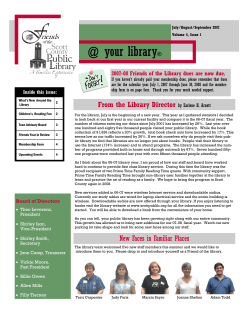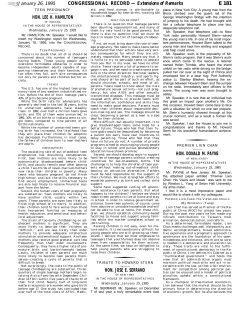
RELATIONSHIP REDUX: By Bill Albert and Jessica Sheets
RELATIONSHIP REDUX: Tips and Scripts for Talking to Your Kids About Relationships By Bill Albert and Jessica Sheets BEFORE WE GET STARTED… The teen years are a time of exploration, discovery, learning, and growing up. They are a time when young people are first really faced with profound questions about relationships and sex. Although many parents understand the importance of talking to their kids about sex, far fewer seem to realize just how important it is for them to talk to their children about what it takes to recognize, develop, and maintain a healthy relationship. Let’s face it, having meaningful conversations with your children about relationships is not for the faint of heart. For some parents, talking to their kids about relationships is mission impossible—the equivalent of sitting down with the family pet and tutoring him to take the SATs. So in order to foster a more open conversation—and to help you feel like you’ve got some help with a difficult matter—The National Campaign and our friends at The Dibble Institute have developed this publication. It provides some thoughts on what to say to your children about relationships and underscores why it is so important to discuss the topic. We hope that it provides parents with encouragement to get the relationship conversations started. Right away. FAST FACT: Teens say that the most important thing parents can do to teach them about successful relationships is to talk to them about relationships, not just about the birds and the bees. Teens report that the second most important thing that parents can do is to listen when they talk about the people in their lives. 4 R ELATIONSH I P R EDUX: TI PS AN D SC R I PTS FOR TALKI NG TO YOU R KI DS ABOUT R ELATIONSH I PS DON’T BE AFRAID, YOU’RE IN GOOD COMPANY FAST FACT: Teens say that parents most influence their decisions about relationships—more than friends, the media, other family members, or even their own boyfriend or girlfriend. TIP: Why aren’t more parents talking to their kids about relationships? Parents say the answer is simple: many of them freely admit that they don’t know what to say, how to say it or when to start the conversation. In other words, if you have some concerns about discussing the boyfriend/ girlfriend (bf/gf) thing with your teenage son or daughter, you’re not alone. And that’s understandable—relationships can be a difficult topic to discuss with your children. SCRIPT: I know that talking to me about your relationship with your bf/gf might be a bit awkward. Please understand that I’m interested because I care about you and I care about the things that are important to you. If you are involved with someone, I want to help you make sure that person is someone with whom you are comfortable, someone who supports you, someone who respects your ideas and opinions, and someone who appreciates all the things that makes you who you are. Let me be very upfront. I may not always have the answers and I am sure that when we talk about relationships that I will stumble and not say the right thing from time to time. Still, you have my promise on these two things: (1) I am always here to listen and hope that you will come to me with any questions or concerns you might have, and (2) I will always do the absolute best I can to help you in the decisions you make. 6 R ELATIONSH I P R EDUX: TI PS AN D SC R I PTS FOR TALKI NG TO YOU R KI DS ABOUT R ELATIONSH I PS RELATIONSHIPS 101 FAST FACT: Teens say that trust is the most important part of a healthy relationship. TIP: The device that accurately measures whether someone is in a healthy relationship has yet to be invented. There is no iPhone “Love” application, no Godmother of Relationships to provide advice. So what to say to your teen sons and daughters about whether they have found someone who is right for them? What to say to your kids about the importance of entering relationships with careful consideration and of striving for relationships that are built on such important foundational building blocks as trust and honesty? What are the hallmarks of a healthy relationship? SCRIPT: All relationships—even the best of them—are challenging. Only you know exactly what you are feeling. Only you know for sure if you are with Mr./Ms. Right. Even so, there are some things that seem to make all the difference in a relationship. Here are some questions I want you to think about carefully. Be honest with yourself—how you answer might be all the guidance you need. Please know, however, that I am always—anytime, anyplace—happy to sit down and discuss these important issues with you in more detail. • Does your bf/gf understand how special you are and do they appreciate all those things that make you special—your love of gardening, sports, video games, trashy novels? That is, do they respect you and all that you are? • Trust is important in all types of relationships. Do you trust your bf/gf and — just as important— does he/she trust you? • Open and honest communication is also a critical ingredient of any healthy partnership. Do you have ongoing, open, two-way conversations (not fights, not lectures) about topics that are important to you? Do you discuss your feelings? Your goals? • Does your bf/gf support you through thick and thin? It’s easy to be on board during the good times, but what about when things get rocky? Can you count on him/her to be there for you? • Is your relationship a two-way street? Think about it: does one of you make nearly all of the decisions in your relationship? Do you only hang out with “his friends?” Do you only see romantic comedies or smash-em-up movies? Do both of you make important contributions to what is happening in your relationship? 8 R ELATIONSH I P R EDUX: TI PS AN D SC R I PTS FOR TALKI NG TO YOU R KI DS ABOUT R ELATIONSH I PS RELATIONSHIP WARNING SIGNS FAST FACT: One in five teens who have been in a serious relationship say they have been hit, slapped, or pushed by a partner; one in four teen girls say their boyfriend has tried to prevent them from spending time with friends or family; and one in four teen girls say they have been pressured to go further sexually than they wanted. TIP: We all know that the best intentions and the most promising relationships can go sour. Help your sons and daughters understand not only what it takes to build a healthy relationship, but also provide them with clear guidance on the signs that a relationship is in danger or is harmful. SCRIPT: Knowing if you are with the right person can often seem like a riddle stuffed in a mystery and wrapped with a healthy dose of self-doubt. Knowing that you are with someone who isn’t right for you is much more straightforward. Take a step back and ask yourself if your bf/gf: • Pressures you to make the relationship very serious or have sex early in the relationship? • Acts jealous or possessive? • Ignores boundaries of any sort that you have set? • Insults you privately or in front of others? • Doesn’t let you have your own identity and tries to control where you go, what you wear, or what you do? • Texts or IMs you constantly? • Refuses to consider your point of view or desires or simply doesn’t listen to what you have to say? • Keeps you from talking to or spending time with close friends or family? • Drinks too much or uses drugs and then blames the alcohol and drugs for his/her behavior? • Threatens to hurt you or themselves if you leave them? If your bf/gf has said or done any of these things, they are not right for you and are definitely not ready to be in a respectful, caring relationship. If something seems like a red flag, it probably is. No bf/gf has the right to treat you with anything other than respect. 10 R ELATIONSH I P R EDUX: TI PS AN D SC R I PTS FOR TALKI NG TO YOU R KI DS ABOUT R ELATIONSH I PS RELATIONSHIPS 2.0 SCRIPT: FAST FACT: One in five teens say they have sent electronically or posted I am so glad that you are using the latest technology to stay in touch with your friends. The ability to know what your friends are up to and to share your thoughts and ideas with them through technology is remarkable and exciting. online nude or semi-nude photos or video of themselves. TIP: Friends with benefits. Sexting. Hooking-up. Friending someone. Facebook. MySpace. Friendster. MyYearbook. Piczo. Imeem. Bebo. Tagged. You’ve probably heard of some of these terms and some of these social networking sites, others probably sound like words we made up to confuse you. The reality is this: For teens, the ability to stay in touch has never been so pervasive—texting, instant messages, social networks—the list is long. Technology has changed the way teens interact with each other and presents new challenges for young people as they navigate the minefield of adolescent relationships. I also know that many young people are not using technology responsibly. A lot of teens say they are sending or posting online sexually explicit messages or images of themselves. Most teens who have sent nude or semi-nude images of themselves say they did so to impress a boyfriend or girlfriend. Is that really how you want to develop a relationship with someone? If someone you’re interested in asks you to send a nude picture of yourself what does that say about that person? Is that someone who is really interested in a meaningful relationship? Remember, you are in charge of your life—don’t let anyone pressure you to do things that you don’t want to do and that you might regret. It is also true that many teens are sharing these images and messages with their friends—do you really want your most private thoughts and images passed around? Here are a few other things I want you to think about: Please remember that what happens in cyberspace may not stay in cyberspace. What might seem like an innocent, fun, and flirtatious activity online can lead to some unexpected real life expectations—most teens say cyber-flirting often leads to hooking up. It’s possible that you can get too serious, too soon—friendships f ostered online can create a false sense of closeness. Remember, it is easier to shade the truth and to outright lie online— technology can blur boundary lines and make things seem more romanticized than they are in real life. One more thing, remember that the decisions you make now online will live on forever in cyberspace. Think of it as a cyber tattoo. Do you really want nude pictures of yourself floating around the internet when you are applying for college or for a job? Just remember, think before you press send. 12 R ELATIONSH I P R EDUX: TI PS AN D SC R I PTS FOR TALKI NG TO YOU R KI DS ABOUT R ELATIONSH I PS EARLY DATING, GROUP DATING, AND THE OLDER PARTNER THING… FAST FACT: 13% of same-age relationships among those aged 12-14 include sexual intercourse. If the partner is just two older, that number doubles: 26% of the relationships include sex. If the partner is three or more years older, 33% of the relationships include sex. TIP: Group activities among young people are fine, often fun, and can be a terrific way to develop relationships that are not necessarily of the intense, bf/gf variety. Steady, frequent, one-on-one dating much before age 16 is another story altogether. In particular, be very cautious about letting your teenage son/daughter develop an intense relationship with someone who is three or more years older. For example, research makes clear that romantic relationships between very young teens significantly increase the risk of too-early and unwanted sex. Dating in the presence of large age differences is similarly a high-risk proposition. On all of these matters—group dating, early dating, or dating someone older—don’t wait until your young teen proposes a plan that differs from your preferences in this area otherwise he/she will think you just don’t like the particular person or invitation. Begin laying the groundwork and ground rules long before dating is even an option. SCRIPT: I know it must seem like I am picking on your bf/gf; that I don’t like them or that I don’t trust them. That is not the case. Please understand that I trust your judgment. Still, whether you realize it or not, the power differences between older boys/girls and their young partners can lead to risky situations, including unwanted sex and sex without protection. I don’t want that for you and I know you don’t want that either. I really don’t want you to find yourself in a situation where you might feel pressured to do something you don’t want to do. A FEW FINAL THOUGHTS… Remember, it’s not just what you say; it’s the example you set. Are you practicing what you preach? Being in a respectful relationship yourself—one that is characterized by trust, love, and respect—can go a long way in helping your children understand why healthy relationships are so important and what helps make a relationship worthwhile in the first place. Don’t call it puppy love! Unfortunately, adults are often dismissive of the feelings teens have for one another. That’s a mistake—these feelings are often real and powerful, even if they might be fleeting. Let your teens know that you take their relationships seriously and that you are ready to talk to them—early and often—about what it takes to develop and maintain healthy relationships. In short, treat your sons and daughters with respect, express love and affection clearly and often, and let them know that you take their relationships seriously. Auhor Information: Bill Albert is Chief Program Officer for The National Campaign. Jessica Sheets is the Senior Manager of Communications for The National Campaign. Both love fuzzy bunnies and pink flamingos. Citation: Albert, W and Sheets, J. (2009). Relationship Redux: Tips and Scripts for Talking to Your Kids About Relationships, National Campaign to Prevent Teen and Unplanned Pregnancy: Washington, DC. Please visit TheNationalCampaign.org, StayTeen.org, and DibbleInstitute.org for more information. Funding for this project was provided by the United States Department of Health and Human Services, Administration for Children and Families, Grant Number: 90-FE-0024. Any opinions, findings, and conclusions or recommendations expressed in this material are those of the author(s) and do not necessarily reflect the views of the United States Department of Health and Human Services, Administration for Children and Families.
© Copyright 2025





















